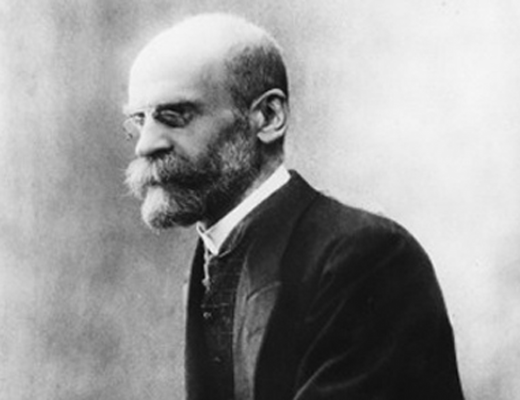1.2.3
Functionalism
Functionalism and Emile Durkheim
Functionalism and Emile Durkheim
Functionalism is a sociological perspective that views society as made up of different parts or institutions that fit together (e.g. the family, education, religion). These different parts help society run smoothly or function, hence functionalism.


Founding sociology
Founding sociology
- The key person in functionalism is Emile Durkheim (1858-1917) who, along with Marx, are considered the founders of what we now know as sociology.


Key ideas
Key ideas
- Unlike Marxism, functionalism focuses on the positive role that the different structures perform in society.
- Institutions within society meet the needs of society by performing functions to ensure its survival.


Durkheim
Durkheim
- Durkheim studied many areas of society, including:
- Crime.
- Religion.
- Education.
- He focused on the functions they fulfil in meeting the needs of society.


Criticisms
Criticisms
- Functionalism overlooks the dysfunctional or negative aspects of institutions.
- For example, crime and religion don’t always perform positive functions for society.
- Many functionalist ideas are out-dated.
Max Weber
Max Weber
Max Weber (1864-1920) was another major contributor to the foundation of sociology. He was involved in topics such as social class, status and power and, like Marx was interested in issues such as the development of capitalism and social class.


Weber's key ideas
Weber's key ideas
- Weber's key ideas:
- Social Class.
- Status.
- Power.


Class division
Class division
- Weber agreed with Marx that ownership and non-ownership of property is the most important basis of class division.
- Unlike Marx, Weber argued that class division was not based solely on economic factors, but was also linked to skills and qualifications which affect the jobs people can get.
- Higher qualifications place people in a better position within the labour market.


Status
Status
- Weber saw status as another aspect of social stratification in addition to class.
- Status refers to how much prestige or social standing a group has (e.g. judges have very high status in society).


Power
Power
- According to Weber, status does not always relate to income, for example, religious leaders might have high status but low income.
- Weber argued that people obtain power in so far as they can get other people to behave in the way they want them to, despite opposition.


Criticism of Weber
Criticism of Weber
- Weber only focussed on class divisions in society and didn’t explore inequalities based on gender, ethnicity or age.
1The Sociological Approach
1.1Introduction to Sociology
1.2Sociological Approaches
1.3The Consensus vs. Conflict Debate
2Families
2.1Functions of Families
2.2Family Forms
2.3Conjugal Role Relationships
2.4Changing Relationships Within Families
2.5Criticisms of Families
3Education
3.1Roles & Functions of Education
3.2Processes Within Schools
4Crime & Deviance
4.1The Social Construction of Crime
4.2Social Control
4.3Criminal & Deviant Behaviour
5Social Stratification
5.1Social Stratification
5.2Poverty as a Social Issue
6Sociological Research Methods
6.1Research Methods
6.1.1Research Design
6.1.2The Scientific Method
6.1.3Other Considerations
6.1.4Primary Sources
6.1.5Secondary Sources
6.1.6Surveys
6.1.7Sampling
6.1.8Questionnaires
6.1.9Interviews
6.1.10Observation
6.1.11Statistics
6.1.12Case Studies
6.1.13Longitudinal Studies
6.1.14Ethnography
6.1.15Experiments
6.1.16Small Scale Research
6.1.17End of Topic Test - Research Methods
Jump to other topics
1The Sociological Approach
1.1Introduction to Sociology
1.2Sociological Approaches
1.3The Consensus vs. Conflict Debate
2Families
2.1Functions of Families
2.2Family Forms
2.3Conjugal Role Relationships
2.4Changing Relationships Within Families
2.5Criticisms of Families
3Education
3.1Roles & Functions of Education
3.2Processes Within Schools
4Crime & Deviance
4.1The Social Construction of Crime
4.2Social Control
4.3Criminal & Deviant Behaviour
5Social Stratification
5.1Social Stratification
5.2Poverty as a Social Issue
6Sociological Research Methods
6.1Research Methods
6.1.1Research Design
6.1.2The Scientific Method
6.1.3Other Considerations
6.1.4Primary Sources
6.1.5Secondary Sources
6.1.6Surveys
6.1.7Sampling
6.1.8Questionnaires
6.1.9Interviews
6.1.10Observation
6.1.11Statistics
6.1.12Case Studies
6.1.13Longitudinal Studies
6.1.14Ethnography
6.1.15Experiments
6.1.16Small Scale Research
6.1.17End of Topic Test - Research Methods
Unlock your full potential with Seneca Premium
Unlimited access to 10,000+ open-ended exam questions
Mini-mock exams based on your study history
Unlock 800+ premium courses & e-books
